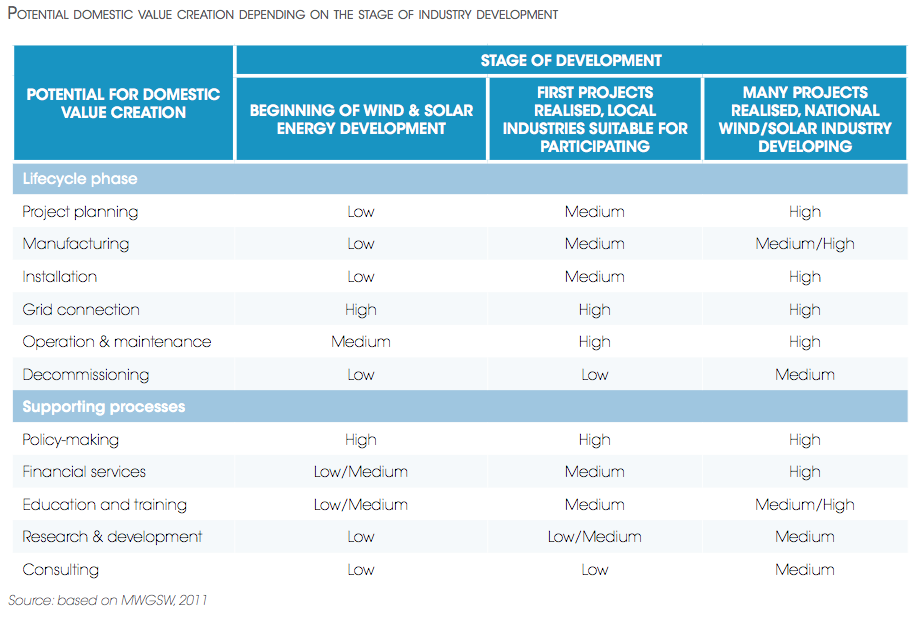The following is excerpted from the new IRENA report The Socio-economic Benefits of Solar and Wind: an econValue report. Foreword by Adnan Z. Amin, director-general of International Renewable Energy Agency.
Renewable energy technologies have experienced rapid deployment over the past few years, mainly driven by the ambition to improve energy security, enhance energy access, and mitigate climate change. Many countries are now exploring ways to stimulate social and economic growth through the development of the renewable energy sector. Investment in renewable energy can generate new sources of growth, increase income, improve trade balances, contribute to industrial development, and create jobs. While such socio-economic benefits are increasingly gaining prominence in the global renewable energy debate, specific analytical work and empirical evidence on this important subject remain relatively limited.
The Socio-economic Benefits of Solar and Wind: an econValue report bridges the knowledge gap with a holistic analysis of the environmental, social, and economic value created from large-scale solar and wind energy deployment.
In doing so, it offers a new conceptual framework in support of ongoing analytical work conducted
by IRENA and other partners in the Clean Energy Ministerial with a view to reinforcing the economic and business case for renewable energy.
The report highlights the significant potential for value creation along the different segments of the value chain for solar and wind technologies, including project planning, manufacturing, installation, grid connection, operation and maintenance, and decommissioning. Additional opportunities for value creation arise from supporting activities, such as education and training, financing, and policy making. To benefit fully from the socio-economic impacts of renewable energy, the right mix of cross-sectoral policies, covering deployment and industrial policies, is needed. Building a domestic renewable energy industry requires stimulating investments, strengthening firm-level capabilities, promoting education and training, and encouraging research and innovation.
The country case studies presented here demonstrate that there is no one-size-fits-all policy solution to maximize value creation, and that successful policy making requires close coordination and engagement of diverse stakeholders.
The report underlines the need for sound quantitative analysis of expected socio-economic effects in
order to enable informed policy choices. It presents different tools available for such estimations, gives guidance for selecting the most appropriate among them, and emphasizes the importance of comprehensive data for such analysis.
I am confident that the findings in this study will further strengthen the business case for renewables, as well as provide a valuable reference point in discussions on value-creation opportunities. The recommendations of the report can contribute to policy design and implementation that maximize socio-economic benefits from the transition to a sustainable energy future.

Summary for policy makers
Socio-economic benefits are gaining prominence as a key driver for renewable energy deployment. With many economies faced with low growth, policy makers see potential for increased income, improved trade balance, contribution to industrial development and job creation. However, analytical work and empirical evidence on these topics remain relatively limited.
In an effort to contribute to this field of knowledge, this report presents a conceptual framework for analyzing the socio-economic effects of large-scale renewable energy deployment. The proposed framework is adapted from the existing literature and aims to understand the social, economic and environmental value that can be created from renewables. For analytical purposes, it classifies socio-economic effects as: macroeconomic, distributional, energy system-related and other cross-sectoral (additional). This analysis focuses on one category of effects, namely macroeconomic, within which four variables are addressed – value added, gross domestic product, welfare and employment.
Socio-economic effects can be measured along the different segments of the value chain, including project planning, manufacturing, installation, grid connection, operation and maintenance, and decommissioning.
Further opportunities for value creation exist in the supporting processes such as policy-making, financial services, education, research and development, and consulting.
Find the full report here.
Filed Under: Financing, News, Policy




